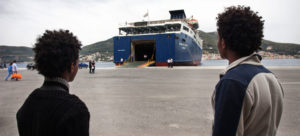UN to improve Eritrea’s Peace
Eritrea: Peace deal prompts hope of internal reforms, to improve fundamental human rights.
Many of the Eritreans wait to board a commercial ferry at Samos Island, Greece, and the number has growing of Eritreans are seeking asylum in Europe.
The peace agreement between Eritrea and Ethiopia has raised hopes that improving human rights will be front and centre on Eritrea’s path forward, according to a United Nations Special Rapporteur on Tuesday.
On 9 July, leaders of both countries signed a Joint Declaration of Peace and Friendship, raising expectations that the end of the “no war, no peace” stalemate between them, would positively impact Eritrea’s internal human rights situation.
The thaw in relations between the neighbouring countries, who fought a bloody, unresolved war in the late 1990s, began earnestly in June, when Ethiopia’s newly-elected leader, Abiy Ahmed, made peace overtures to his counterpart.
Eritrean authorities must urgently embrace and implement bold measures to strengthen protection of and respect for human rights, justice and accountability – UN Rapporteur
Yet, repression reportedly continues within Eritrea.
“During the past 17 years, the Government of Eritrea has maintained tight control over the country, stifling any form of public debate and participation,” said Sheila B. Keetharuth, Special Rapporteur on the situation of human rights in Eritrea.
Eleven government officials who had criticised the President in an open letter, along with 10 independent journalists, were arrested in 2001 – silencing public political discourse and the independent press – setting off a period of sweeping oppression throughout the country.
“I have received reports that the former Minister of Finance,” Ms. Keetharuth continued, “who recently wrote two books on the current state of affairs in the country, including the rule of law, has been arrested in Asmara during the morning of 17 September.”
If confirmed, the arrest, on the eve of the 2001 clampdown anniversary, would question the will for genuine reform, “especially regarding respect for fundamental rights and freedoms,” the expert asserted.
According to Ms. Keetharuth, while comprehensive domestic reforms would be required for a free, fair, democratic society with all human rights entitlements, the Government can take immediate action towards that end in three concrete, urgent areas.
Firstly, the families of prisoners who have disappeared in Eritrean jails should be informed about the fate of their loved ones. Secondly, implementing the 1997 Constitution would provide a natural basis for a national legal framework and a society governed by the rule of law. And thirdly, the Government could inform new military conscripts that they would not have to serve beyond the 18 months stipulated by Eritrean law.
“The achievement of peace between Eritrea and Ethiopia must be duly celebrated,” stated Ms. Keetharuth. “However, Eritrean authorities must urgently embrace and implement bold measures to strengthen protection of and respect for human rights, justice and accountability,” she concluded.
Special Rapporteurs are appointed by the Geneva-based UN Human Rights Council to examine and report back on a specific human rights theme or a country situation. The unpaid positions are honorary, and independent from any government or organization.




